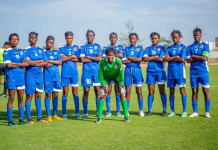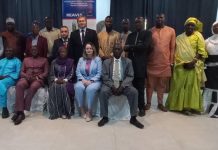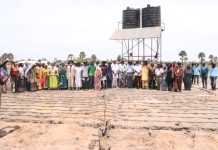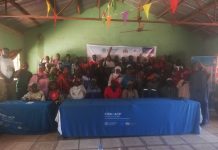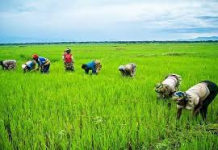By Kebba Jeffang
The Gambia’s Human Development Index is ranked 172 out of 187 countries in the world and that poverty is still pervasive as  stated by the decade findings of the International Fund for Agricultural Development (IFAD).
stated by the decade findings of the International Fund for Agricultural Development (IFAD).
This was revealed by Mr. Ashwani K. Muthoo, Deputy Director of the Independent Office of Evaluation of IFAD (IOE),when presenting the decade findings on his organisation’s supported agricultural activities in the country before the officials of the Gambia Government and other stakeholders at a local hotel on Thursday, 3 December, 2015.
The report, which focused on the IFAD supported projects with a total cost of US$196.8 million,presented the successes and weaknesses of the agricultural interventions in the country as well as conclusions and recommendations of the Independent Evaluation Office of IFAD Country Strategy and Programme.
“Though the contribution of the agricultural sector to the country’s GDP has decreased from 28 to 20 percent over the last decade; it still employs about 65% of the national labour force. In 2011, agricultural production was low due to drought, and 2014 has again been difficult. Though no area in the Gambia is yet observed to be in an emergency or famine….. The nutrition situation is also worrying, with stunting between 14 to 30%,” said Mr. Muthoo.
The IFAD Deputy Director of the Independent Office of Evaluation of IFAD (IOE) said his office is an integral division in the organisational architecture of the Fund. He said the purpose of the Gambia country programme evaluation is to provide building blocks that can assist the government, IFAD and other concerned partners in developing the next country strategy-COSOP-and projects financed by IFAD in the Gambia. He said the objective is to discuss findings, conclusions and recommendations of the evaluation.
“….with the country’s Gross Domestic Product (GDP) increasing from US$578 million in 2004 to US$914 million in 2013, though erratic with patterns, nevertheless, poverty is still pervasive,” states the IFAD Report .
On the findings, Mr. Muthoo pointed out that the evaluation finds that the portfolio performance was found to be weak in effectiveness though many outputs were achieved, the programme lacked an adequate targeting strategy, and was weak in including a description of how geographical targeting should be used to focus on pockets of poverty and therefore did not adequately tailor interventions to the needs of the beneficiaries.
“Sustainability of benefits is found to be an area for improvement. In general, sustainability has been limited by lack of ownership and engagement by beneficiaries in the planning, implementation and maintenance and oversight of project activities and infrastructure. High staff turnover especially in the Ministry of Agriculture and IFAD supported projects has also constrained effectiveness and sustainability ratings. The value chain activities although well planned in the programme design, were not properly linked with agricultural production or building on agricultural knowledge,” disclosed the Deputy Director of the Independent Office of Evaluation of IFAD.
The event, which was held at a local hotel and organised by the Ministry of Finance and Economic Affairs,also witnessed the presentation of the conclusions and recommendations of the Independent Evaluation office of IFAD country strategy and programmes in The Gambia.
Speaking, at the ceremony, Madam Isatou Njie Saidy, the Vice President of the Gambia hailed IFAD for their unflinching support to the agricultural sector of the government of the Gambia for the past years.
Madam Saidy noted that IFAD had supported ten projects and programmes at a total project cost of US$196.8 million. She said out of this sum, the amount of IFAD lending corresponded to US$73.1 million, while other contributions to the portfolio were provided by the Fund in the form of regional grants.
“The counterpart contribution by the Gambia government and project beneficiaries accounted for US$99.5 million.The cooperation between IFAD and the Gambia government dates back to 1982 and involved loans, grants and non-lending activities, including knowledge management, policy dialogue and partnership building. The African Development Bank, the World Bank, the International Development Association, Islamic Development Bank, the World Food Programme, and the governments of The Netherlands, Germany, Italy and Spain have participated in IFAD’s funded projects since the beginning of IFAD’s operation in the country,” said VP Saidy.
The Vice President added that the Gambia’s development agenda is enshrined in the country’s Vision 2020, which seeks to transform The Gambia into a dynamic middle income country, socially, economically and scientifically over a 25-year period. She said the objectives of IFAD’s evaluation are to assess the performance and impact of IFAD-supported operations in the country, and generate a series of findings and recommendations that serve as building blocks for the future cooperation between IFAD and the Gambia government, VP Njie-Saidy stated.
“The country programme evaluation traditionally covers IFAD’s operation over a period of approximately ten years, taking into account evolving objectives of the portfolio and change in priorities of the government.The evaluation covers IFAD’s cooperation between 2004 and 2014 and takes account of evolving approaches, as well as assesses the results and impact of IFAD-supported operations since the COSOP approval.The outcome of the evaluation would contribute meaningfully to the national development objectives of the government, by enhancing agriculture and rural development policies and the needs of the poor,” VP Njie Saidy stated.
She noted that it will also impact on the sustainability of development interventions, assessing whether benefits of projects are likely to continue after the completion of IFAD assistance, including prospects for innovation, replication and scaling up gender equality and women empowerment.
Mr. Abdou Kolley, the Minister of Finance and Economic Affairs, hailed IFAD for their continuous collaboration since 1982. He said the evaluation is an opportunity for the side of the Gambia as the report contains critical issues for the past decade. He said this will avail them to know what went well and what the challenges are for prosperity.
He urged for criticality in the evaluation as Gambia will accept any weakness that is indicated and improve on it. He said there is no need to be defensive to the reality of the report but that it must be taken and turn such challenges into opportunities in order to correct the trend.
Madam Ade Mamonyane Lekeotje, UN Country Resident Coordinator said the support of IFAD for the Gambia is not only relevant but indispensable. She noted that IFAD support is critical to the achievement of government’s objective of PAGE, Vision 2016 and vision 2020 noting that the backbone of Gambia economy is agriculture.
Madam Ade said “Agriculture is central in the development of this country and the achievement of the aspiration of being a middle income country. The findings of this evaluation raises very pertinent issues, critical programmes include issues of partnership and collaboration, capacity retention, sustainability, diversification, rural financing etc.”
She concluded that the recommendation provided in the report will guide how to address these critical issues.
Mr. Ides de Willebois, Director of West and Central Africa Division, IFAD said evaluation is an important milestone in their development work. He said the difference will come when collective resolve is taken to prioritise the required actions to systematically and comprehensively address the highlighted key areas with the aim of improving the pro-poor impact of development interventions in the Gambia.
“IFAD has sharpen its mandate to invest in rural people in a sustainable way by clearly demonstrating and providing evidence of how many of the over 700, 000 rural people have been reached, is our overarching priority, both for the government and IFAD,” he said.
